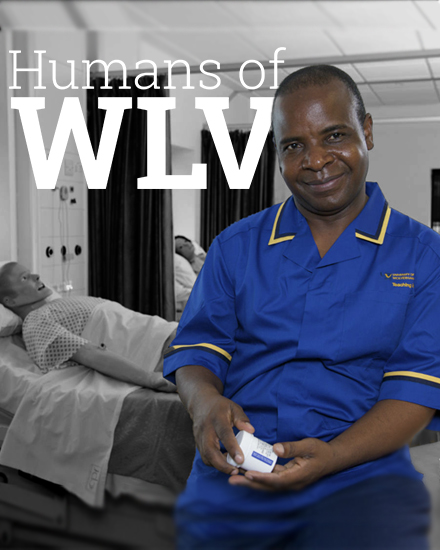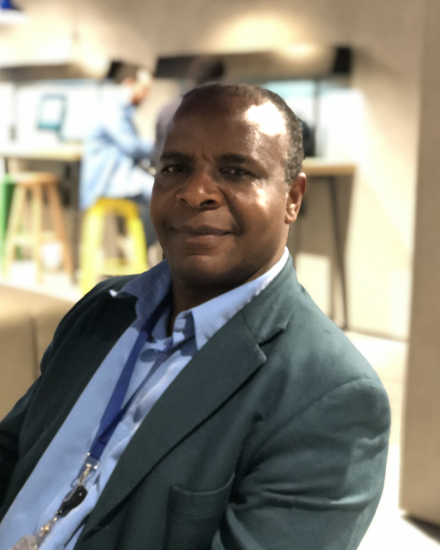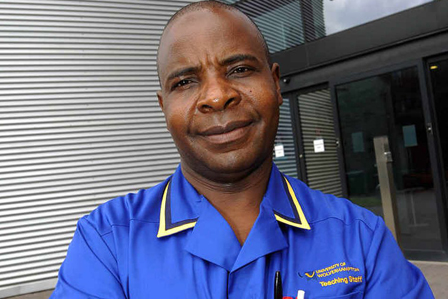Dr Murandu's Story
Growing up with a single male parent was very hard.
My father was very regimental like a military man. His hard stance on discipline was one of the memories we recall, me and my elder brother. He was a very strict father who moulded our resilience today. I was one of the four boys left behind when mom left my father. She felt like a prisoner and not loved, even though she had borne seven children to my father. I guess women were like tools in the villages meant to bear children and listen to the man; a scenario portrayed by D.H. Lawrence in Sons and Lovers. Having said that, the departure of my mom left a void in the family. We had no mother and my father was now both the mother and the father. At times supported by my elder brother, who had to outgrow his age to fit into the role left by our mother. He would do most of the house chores at an early age until his departure going to a boarding school.
During these arduous times, I lost my toddler brother having succumbed to childhood communicable diseases that I was also a victim of but managed to survive. My father took us early morning to the hospital where we were attended to but discharged home. A few kilometres deep into the dark green woods, my brother gave up the ghost. It is a memory that is still vivid in my mind today. I recall my brother’s eyes fixed and dead, my father trying to revive him with no success. He tried giving him water and the water was just drilling down his cheeks. I saw tears running down my father’s cheeks holding a lifeless toddler body. He had two choices, to travel back to the hospital or go home.
We were closer to the hospital than walking all day long home. He chose to travel home, holding in his arms his precious child, so handsome and peaceful. He also had another toddler (myself) who was not feeling well. The journey meant several pit-stops to allow my gaining strengths. And finally, we got to home where he was given a cradle to tie his lifeless child on his back instead of carrying him in his arms. It was this experience that left a huge impact on my life. I questioned the idea of not going back to the hospital and also the choice of heading home with a dead child rather than take him back to the mortuary. The reasons were never explored as my father is no more and I regret having failed to ask him. My guess was to do with the care given to him; the health care professionals did not support my father well. Why would they discharge him with two sick children? Maybe hospital fees were a problem? Were fees more important than the life of the two children? All these questions remained with me throughout my childhood and into my adulthood.

Dr Moses Murandu is a Senior Lecturer in Adult Nursing at the University
This later partly formed the basis of my choice to consider a healthcare profession.
Otherwise, I wanted to be an air force pilot and the thought of killing people led me to opt-out of this career. I then strongly considered accounting; which was detoured by lack of university tuition fees. I was left with pursuing nursing as a career, the fees were affordable and I was undertaking the course at a Christian institution Maluti Adventist Hospital School of Nursing in Lesotho. A college that was internationally recognised and had multi-national tutors. Ever since starting the course, I have never regretted and I have made an impact on many patients.
After completing my registered general nurse course in Lesotho I moved to St Monica’s Maternity Hospital in Capetown where I undertook Midwifery.
On completion, I was awarded the Ethel Bell Award as the all-round Midwifery student in both theory and practice. I then moved to False Bay hospital in Fish-Hoek to take up a post as a double qualified, where I was to work rotationally around Accident and Emergency, Male medical and Surgical, Female medical and Surgical, Maternity and Paediatric wards. This appointment was one of my epics as a registered nurse and midwife as it was a whites-only hospital with no black patients, to begin with. After Mandela’s release, the hospital was forced to accept blacks and as a result, they had to employ black nurses. The first black nurses employed were me and my friend, both from Zimbabwe and had trained in Lesotho - a very small country with little resources as compared to South Africa, that had first world funding and resources. The appointment was not an easy ride as the patients, doctors and nurses were very sceptical of our appointment.
They did not acknowledge our being appointed and wanted us out.
The only supporting person was the Matron, who from time to time debriefed us reassured reminding us of the bigger picture of our appointments. There were open racists’ remarks from certain medical doctors, telling the Matron the hospital was going down employing blacks. I recall, my first shift on duty I was never orientated and the assigned qualified nurse to show me around would spend the whole day moaning about the old order, how nice it was before blacks started being admitted. I wondered how I was going to work here, let alone know the policies and procedures to follow. The following day was a Sunday and I was on my own. I tried hard to manage the ward and applied the management skills that we had learnt from the college with good effect but the policies and procedures of a hospital are supposed to be explained. You cannot provide effective care without knowing how certain acts of care attend with reference to the hospital policy. On this occasion, it was administering blood transfusion of a private patient whose medical doctor had collected a sample of blood for cross-match. He left the blood without telling me how to go about assuming I knew the procedure with only less than twenty hours working at the hospital. I saved the sample in the fridge awaiting transportation to the laboratory at the referral hospital. By noon the doctor was back to commence the transfusion and lo and behold the blood was safe in the fridge. He was mad at me citing how useless blacks are and they should have never been employed. He promised to report the matter to the Matron the following Monday. I was terrified as if I had killed a patient. I phoned the other ward to ask one of the nurses who had been working there for a while and the procedure was explained to me; phone the transport section from the referral hospital and come and collect the blood and be cross-matched and they will deliver the blood. This, I did promptly and by roughly 3 or 4 o’clock the blood was available ready to be transfused. The doctor came and commenced the transfusion. He never said a word to me and left. I was to monitor the transfusion and continue with the rest of the blood, this I did without any problems. Monday morning the doctor was in the Matron’s office telling her of the incompetent black nurse she had employed. It pained me to see how I was deemed incompetent because of the failure of orientation. I absorbed the abuse and all the racist remarks. The matron later came and invited me to her office, I thought she was to dismiss me.
Fortunately, she stated that she had heard all of the complaints and she is very confident this was dust rising and it will settle. She reassured me that, the staff had never worked with blacks and I should expect more of these scenarios. I thanked her and left her office with mixed feelings, should I continue or leave early without further abuse. And I chose the latter. I worked and endured the hardships. My friend who was working in the female ward experienced the same negative comments. The patients were very sceptical and would not take medication from me. I recall some of the church members doubted my training. I would give patients medication to care assistants, as they would not take medication from me and were afraid I would give them the wrong drug or dose whatever they felt in their minds. My spirits were not dampened as I continued working with care and compassion, despite their negativity towards me. Within a year I turned out to be their favourite nurse, the very doctor who denigrated me would not stop shouting my praise and when referring his patients for admission he would ask who is on duty, if he hears I was on, he would commend, I am sending my patient happily, so was life as a pioneer at transforming a whites-only hospital into a multi-racial institution and I am proud of my experience over there. When I was moving to come over to the UK everyone cried and begged me to stay, but it was time to venture into the small Island that at one point conquered three-quarters of the world, I wanted to experience how they undertake their nursing and also taught the nurses in these Isles how we do things in Africa.

There are several challenges when you are working as a minority with patients and other health care professionals coming from the same race.
You are viewed as an intruder ready to cause upsets to the status quo. The results are preservations of the past and are resistant to change. This was a constant battle I faced from both staff and patients. At one point an ambulance brought in a coloured boy, severely knifed, and the doctor liaising with a white nurse decided to bandage and let him go home. He instructed from his room (sleeping) that he should be bandaged and sent home to pack in the morning. I happened to go down to accident and emergency to check why the ambulance took so long to leave. I found the young man bleeding profusely through the bandage. I called him into the assessment room and examined the bleed. He had been severed on the radial artery. I applied pressure and called the doctor. He responded and asked me why I was calling him instead of the white sister (an enrolled nurse) who was my junior. I told him I was calling him as I was in charge and concerned about the patient. He shouted at me telling me to go to the Transkei where I came from and slammed the phone down. On my ear. I picked the phone and called him again. Once more he blasted me with racist words, calling me a baboon and I should go back to the mountain and slammed the phone on my ear. I picked the phone and called him again, but this time my voice tone was full of anger; ready to face any challenge he paused. I saw the young man losing blood and the medical doctor who is supposed to be helping was so selfish and did not care yet he was paid by the taxpayer to look after these patients. I am sure he realised my anger and decided to come down and review the patient. On arrival, he was so pompous and ignored me talking to the care assistant asking what was going on. He examined the patient and realised the case was beyond his capability. He referred the patient to the vascular specialists in Groote Schuur hospital. When the patient had gone he called me for a debrief in his office. He apologised to all remarks and comments he had made about me citing his upbringing in Poland; they were told blacks don’t think, they are like monkeys. I listened and asked myself, how many patients of colour were losing their lives due to negligence? I accepted his apology but still asked myself are healthcare professionals not supposed to see no colour and treat each individual with respect and dignity. Surely, this experience demonstrated a lack of that expectation.
Another experience...
Another experience was from a colleague who was handing in after a long and busy day in the maternity ward. I was to inherit this supposed difficult couple who were expecting their first child. The nurse was busy telling me how difficult the husband had been throughout the time of admission. I was listening but took little notice on the part of being difficult. I always assess my patients and judge them on my interaction with them. While she was handing over this private patient, the private doctor phoned to check how the woman was progressing. The midwife was busy explaining how difficult the husband was when suddenly he burst into the office and demanded to talk to the doctor. He summoned the doctor to come and review his wife immediately as he was paying lots of money for his services and then slammed the phone. After the handover, I followed the man who closed the door behind me. I knocked and he refused to open. I continued knocking and requesting to check the mother and baby. Later the wife encouraged him to open the door. I entered and greeted both and the wife answered, but the husband did not. He continued looking outside the window. I requested the wife to check her baby’s heart to which she agreed. I check and informed her of the heart rate, that it was alright and the baby was engaged. I wanted to give her an enema as her rectum was full. I gave her the enema and instructed them to call should they need assistance. The husband later walked the wife to the toilet and thereafter their doctor arrived. The doctor requested to see his patient alone at that point and I gave her the opportunity to do so. A few minutes later he was out calling me into the office. He asked me what I had done to the couple as they were singing praises of me. My response was nothing much but I had done my routine to what I always do to my patients. He requested that once he goes back to finish his dinner that I should call him when she is ready to push. Not long after he had left the woman wanted to push; I took her into the labour ward and delivered the baby still waiting for the doctor whom I had called. On arrival, the baby was out and he delivered the placenta. The couple were not pleased with the doctor and wanted to pay me instead and I told them my services were free as I was working for the state. If they had come as state patients then it would have been free. Three years later, the mother brought her beautiful thriving daughter to see me and also told me the shocking and touching news. She brought a watch as a present and informing me that the watch was the husband’s that he used to check the minutes I was counting her baby’s heart rate. She said he did not trust me and my competence. He felt embarrassed and wanted to give me the watch as a present for his racist thoughts. I did not know every time I did the observations and leave the room he also did his and they matched mine.
My drive is services to humanity
My drive is services to humanity; we live on this earth as lodgers of God who is our landlord. Our rentals are a service to humanity. One day when my time on this earth is complete I do not want to owe God any rentals. I should be able to say I did my utmost to help each and every creation of God. I do not look at my achievements but look at what should I do next to make a difference to human suffering. Like now, there is Covid-19 and I have helped and saved several people who had severe Covid-19 symptoms, some were not going to make it but they recovered from my innovation.
What makes me human
Human beings are anatomically similar and related to the great apes but are distinguished by a more highly developed brain that poses articulate speech and abstract reasoning. So I try to use my brain in a positive way that brings alleviation of human suffering. I see no colour, race or creed but only the creation of God that requires my services in order to pay my rentals. That is what makes me human. When the time comes to pass on, my life must be reflected upon my service to humanity not my troubles on humanity. More so, working for the University of Wolverhampton makes me human as people like you and me, and colleagues and the rest of the university rally around my visual field and that alone makes me human. You cannot be human when you live like an animal.

In 2015 Dr Moses Murandu clinched third prize in the best research from a developing country award category at the Journal of Wound Care Awards.


/prod01/wlvacuk/media/departments/digital-content-and-communications/images-2024/240328-Varsity-Line-Up-Resized.jpg)
/prod01/wlvacuk/media/departments/digital-content-and-communications/images-18-19/220325-Engineers_teach_thumbail.jpg)
/prod01/wlvacuk/media/departments/digital-content-and-communications/images-2024/240404-Digital-Humanities-Training-Resized.jpg)
/prod01/wlvacuk/media/departments/digital-content-and-communications/images-2024/240320-Uzbekistan-Resized.jpg)
/prod01/wlvacuk/media/departments/digital-content-and-communications/images-2024/240229-The-Link-Resized.jpg)
/prod01/wlvacuk/media/departments/digital-content-and-communications/images-2024/240404-Pharmacy-Students-Resized.jpg)
/prod01/wlvacuk/media/departments/digital-content-and-communications/Moses-Header.jpg)